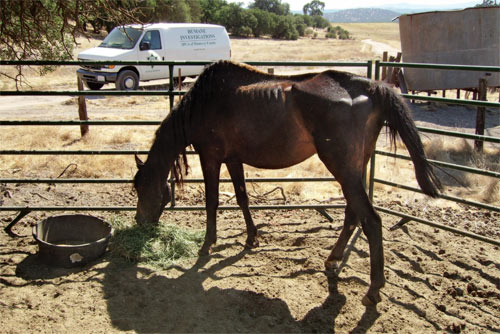
Over the past three years, recession-related headlines have typically focused on topics such as stock market swings, unemployment and foreclosures. Not surprisingly, however, the impact of recent financial issues has spread beyond families and businesses. According to the SPCA for Monterey County, the economic downturn has contributed to a record number of horse neglect, abandonment and surrender cases.
“We took in about 35 horses last year, and we currently have 38 in our care. That’s an extraordinary number. In the early 2000s, we’d see four or five horses a year,” says Gary Tiscornia, SPCA for Monterey County executive director. “One of our latest seizures was from an individual whose ranch was foreclosed and he left the horses. Clearly it’s an economic situation.” Some owners make the difficult decision to surrender their horses to the SPCA after finding themselves unable to afford proper food, shelter and care. Other horses arrive after being removed from abusive living situations, while a small number are simply abandoned by their owners and rescued in fields, on beaches or in parks.
“In one case, a horse just appeared one day in a rancher’s pasture. Somebody had backed up in the middle of the night and turned her loose…That’s not uncommon anymore. We see people turning their horses loose in areas where they just can’t survive,” Tiscornia says. Desperate owners, he believes, don’t always know that his organization takes in horses. Many humane associations lack the facilities to handle large animals, but the Monterey County SPCA can more effectively address the challenge because it sits on 218 acres. When its existing horse barn reached capacity, for example, staff members set up stalls and shade structures in the paddock area and opened fields to accommodate more animals.
Associated costs, however, add up quickly. “We’re $20,000 over our [fiscal year] budget in outside veterinary care right now because a lot of horses come in with different problems,” says Tiscornia. “You can imagine the cost of medical care to bring them back to health.” Adoption often is another hurdle. The SPCA website features several available horses, representing a range of breeds and varying in age from a few months to more than 20 years old. Matching them up with the right owner takes time.
“There is never a time limit on any animal that comes to us. An average dog or cat might stay here 20 to 30 days, but a horse might stay well over a year, sometimes even two years,” Tiscornia says.
Horses are harder to place, in part, because they require more space than traditional pets. New owners also have particular motivations for adopting. An aging or injured horse might not appeal to parents teaching a child to ride, for example. Still, even horses that can’t be ridden make good companions, says Sharon Regan of Carmel. She’s adopted three horses from the Monterey County SPCA, and she provided temporary housing for horses, goats, sheep and chickens during the 2008 fires in Big Sur. One of Regan’s horses was in very poor health when she took him in.
“They didn’t think he was going to make it,” she says. “I just felt that he deserved to be placed, even if it was for a day or two days or a month.” Regan has had positive experiences adopting both older, injured horses and younger, more athletic ones, and she reminds potential owners to consider their goals before bringing home a horse. “It’s about what you want the animal to bring to your life,” she says.
Whatever type of horse they choose, families also need to consider what they can spend prior to adopting. Tiscornia estimates an investment of at least $3,000 a year for those boarding a horse—or the price of land and shelter construction for those keeping animals at home—plus ongoing costs for food, veterinary bills and regular hoof care. Those looking to ride, show or compete can also expect to spend money on things like gear, a truck and trailer, lessons and other necessities. In addition to covering these costs, horse owners—and all pet owners—must be cognizant of the bigger commitment they are making.
“The bottom line, whether it is dogs, cats, horses or any other kind of animal, is that if you’re going to acquire one, you need to have a plan for lifelong care,” Tiscornia says. “People acquire animals and often think in the very short term—the next year, two years, five years. They’re not realizing that with a horse you could be looking at 35 years. We need society, in general, to be thinking in lifelong commitment terms rather than immediate use terms.”
To view horses currently available for adoption, or to volunteer or make a donation, visitwww.spcamc.org or call 831/373-2631. SPCA for Monterey County is an independent agency not supported by a national parent organization or outside funding.